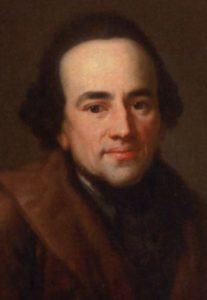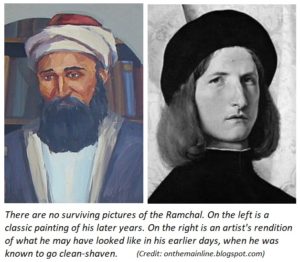Father of Jewish Enlightenment
 Moshe ben Mendel (1729-1786) was born in the Germanic municipality of Dessau to an impoverished, religious Jewish family. His father was a sofer (a Torah scribe), and trained young Moshe in the scribal arts, as well. Moshe also learned Torah and Talmud with Rabbi David Frankel. When Frankel took up a rabbinic post in Berlin, Moshe moved with him to the capital. To keep him safer and open more opportunities, his father had asked him to make his name more German-sounding, resulting in the name Moses Mendelssohn (“son of Mendel”). Mendelssohn continued in his rabbinic studies with the intention of becoming a rabbi, but also took up the study of mathematics, Latin, and philosophy. He soon began learning French and English as well, with an influential Jewish physician and tutor. That tutor introduced Mendelssohn to renowned German philosopher and writer Gotthold Ephraim Lessing. The two became good friends, and Mendelssohn inspired Lessing’s popular play Nathan the Wise. Mendelssohn’s genius soon spread throughout the secular world, and he even won the top Berlin Academy prize for mathematical proofs of metaphysics (second place went to Immanuel Kant!) In 1763, the King of Prussia granted Mendelssohn the special status of schutzjude, “Protected Jew”. At a time when secularism and atheism were sweeping Europe, Mendelssohn remained a believer and resolved to convince the masses On the Immortality of Souls, published in 1767. The treatise became so popular that people began calling him the “German Plato” and the “German Socrates”. In 1775, an order of expulsion was being drawn up against Swiss and German Jews, so Mendelssohn intervened to get the expulsion rescinded. Mendelssohn was constantly mired in theological debates with his German acquaintances, and often pressured to convert to Christianity. He resisted and defended his faith. Nonetheless, the stress was so great on him that he eventually fell deeply ill and was bedridden. At this point he resolved “to dedicate the remains of my strength for the benefit of my children or a goodly portion of my nation”. To make it more accessible to a wider audience, he started a new German translation and commentary of the Torah. The resulting Biur was hugely popular, and received approbations from many rabbis. Meanwhile, he worked to get various restrictions on Jews repealed, and played an instrumental role in getting Jews in Europe basic human and civil rights. In his Jerusalem, he argued passionately for freedom of religion, and for the Christian authorities to leave the Jews alone. Mendelssohn corresponded with one of the leading sages of the day, Rabbi Yakov Emden, and wrote how he “thirsted” for the rabbi’s teachings. Intriguingly, while Rabbi Emden had criticized the Zohar (the famous “textbook” of Jewish mysticism), Mendelssohn actually defended its authenticity. He also defended the authenticity of nikkud, the traditional Hebrew vowel system. Although he was widely admired and respected in his own day, Mendelssohn’s work opened up the door to more Jews learning secular subjects and entering mainstream society, which led to wider assimilation. Four of his own six children ended up converting to Christianity, and just one grandson remained Jewish. (Another grandson was renowned composer Felix Mendelssohn.) Mendelssohn was later credited with being the “father of Haskalah”, the so-called “Jewish Enlightenment”. Because of this, in the decades after his death he became something of a villain in the Orthodox world, and any positive mention of his name was expunged. Today, he is still viewed negatively in religious Jewish circles, although he had truly done a great deal on behalf of the Jewish people.
Moshe ben Mendel (1729-1786) was born in the Germanic municipality of Dessau to an impoverished, religious Jewish family. His father was a sofer (a Torah scribe), and trained young Moshe in the scribal arts, as well. Moshe also learned Torah and Talmud with Rabbi David Frankel. When Frankel took up a rabbinic post in Berlin, Moshe moved with him to the capital. To keep him safer and open more opportunities, his father had asked him to make his name more German-sounding, resulting in the name Moses Mendelssohn (“son of Mendel”). Mendelssohn continued in his rabbinic studies with the intention of becoming a rabbi, but also took up the study of mathematics, Latin, and philosophy. He soon began learning French and English as well, with an influential Jewish physician and tutor. That tutor introduced Mendelssohn to renowned German philosopher and writer Gotthold Ephraim Lessing. The two became good friends, and Mendelssohn inspired Lessing’s popular play Nathan the Wise. Mendelssohn’s genius soon spread throughout the secular world, and he even won the top Berlin Academy prize for mathematical proofs of metaphysics (second place went to Immanuel Kant!) In 1763, the King of Prussia granted Mendelssohn the special status of schutzjude, “Protected Jew”. At a time when secularism and atheism were sweeping Europe, Mendelssohn remained a believer and resolved to convince the masses On the Immortality of Souls, published in 1767. The treatise became so popular that people began calling him the “German Plato” and the “German Socrates”. In 1775, an order of expulsion was being drawn up against Swiss and German Jews, so Mendelssohn intervened to get the expulsion rescinded. Mendelssohn was constantly mired in theological debates with his German acquaintances, and often pressured to convert to Christianity. He resisted and defended his faith. Nonetheless, the stress was so great on him that he eventually fell deeply ill and was bedridden. At this point he resolved “to dedicate the remains of my strength for the benefit of my children or a goodly portion of my nation”. To make it more accessible to a wider audience, he started a new German translation and commentary of the Torah. The resulting Biur was hugely popular, and received approbations from many rabbis. Meanwhile, he worked to get various restrictions on Jews repealed, and played an instrumental role in getting Jews in Europe basic human and civil rights. In his Jerusalem, he argued passionately for freedom of religion, and for the Christian authorities to leave the Jews alone. Mendelssohn corresponded with one of the leading sages of the day, Rabbi Yakov Emden, and wrote how he “thirsted” for the rabbi’s teachings. Intriguingly, while Rabbi Emden had criticized the Zohar (the famous “textbook” of Jewish mysticism), Mendelssohn actually defended its authenticity. He also defended the authenticity of nikkud, the traditional Hebrew vowel system. Although he was widely admired and respected in his own day, Mendelssohn’s work opened up the door to more Jews learning secular subjects and entering mainstream society, which led to wider assimilation. Four of his own six children ended up converting to Christianity, and just one grandson remained Jewish. (Another grandson was renowned composer Felix Mendelssohn.) Mendelssohn was later credited with being the “father of Haskalah”, the so-called “Jewish Enlightenment”. Because of this, in the decades after his death he became something of a villain in the Orthodox world, and any positive mention of his name was expunged. Today, he is still viewed negatively in religious Jewish circles, although he had truly done a great deal on behalf of the Jewish people.
Should Jews Celebrate Halloween?
Video: The Myth of Moses Mendelssohn
Words of the Week
If you believe you can damage, believe you can repair.
– Rebbe Nachman of Breslov

 Moshe Chaim Luzzatto (1707-1746) was born in Padua, Italy to a wealthy Sephardic family. He studied under some of the great Italian rabbis of the time and was quickly recognized as a prodigy, receiving rabbinic ordination himself while still a teenager. He also took up studies at the University of Padua, and by the time he was just 20 years old had complete mastery of Torah, Talmud, and Kabbalah (Jewish mysticism), as well as philosophy, medicine, and alchemy. He had also written a textbook on Hebrew language and grammar, Leshon Limmudim (predating
Moshe Chaim Luzzatto (1707-1746) was born in Padua, Italy to a wealthy Sephardic family. He studied under some of the great Italian rabbis of the time and was quickly recognized as a prodigy, receiving rabbinic ordination himself while still a teenager. He also took up studies at the University of Padua, and by the time he was just 20 years old had complete mastery of Torah, Talmud, and Kabbalah (Jewish mysticism), as well as philosophy, medicine, and alchemy. He had also written a textbook on Hebrew language and grammar, Leshon Limmudim (predating 